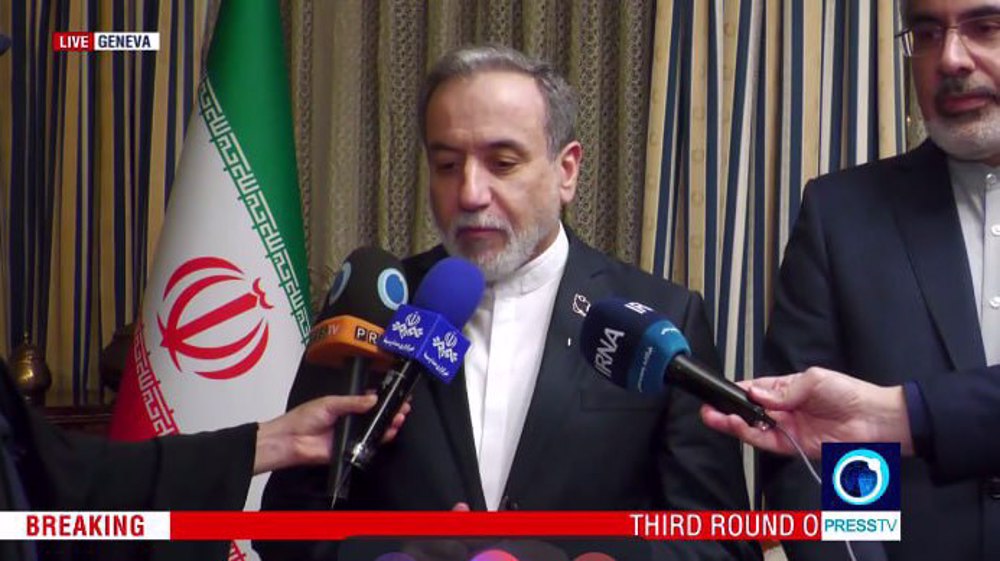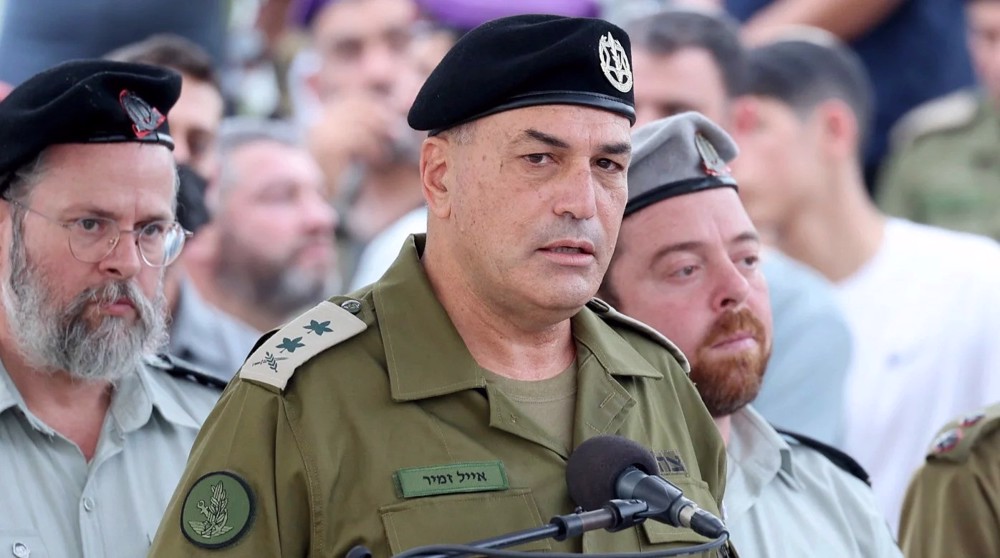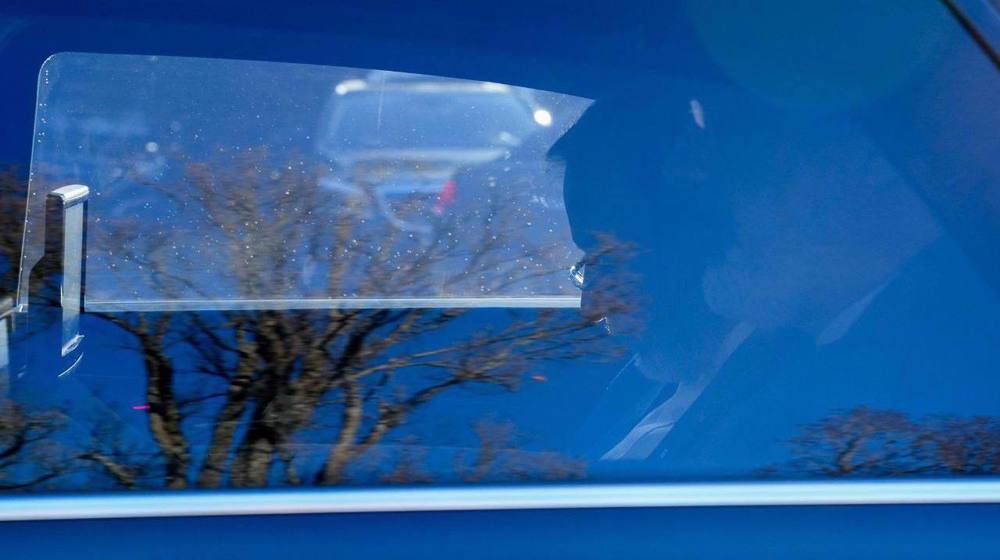US CENTCOM releases grainy video of boat to accuse Iran of attacks
The US military has released a grainy video that it claims showed an Iranian navy boat removing an unexploded mine attached to the hull of the Japanese-owned tanker Kokura Courageous attacked in the Gulf of Oman.
The video was released by the US Central Command late Thursday, purportedly showing "Iranian sailors" removing a mine from the Kokura Courageous' hull.
In the video, a smaller boat is shown coming up to the side of the Japanese-owned tanker. An individual stands up on the bow of the boat and can be seen removing an object from the tanker's hull.
The US claims that the object is likely an unexploded mine.
Video recorded by U.S aircraft of an IRGC Gashti-class patrol boat removing an unexploded limpet mine from M/T Kokuka Courageous. Courageous suffered an explosion while in #GulfofOman. Her 21 crew members were rescued by #USNavy destroyer #USSBainbridge. https://t.co/YpiEUALHWj pic.twitter.com/rjWKJN0qcf
— U.S. Navy (@USNavy) June 14, 2019
"At 4:10 p.m. local time an IRGC Gashti Class patrol boat approached the M/T Kokuka Courageous and was observed and recorded removing the unexploded limpet mine from the M/T Kokuka Courageous," the CENTCOM said in a statement.
It also provided a Powerpoint slide that it claimed showed "damage from an explosion and a likely limpet mine on the hull of the civilian vessel M/V Kokuka Courageous".
Includes photos of the damage to the M/V Kokuka: pic.twitter.com/72MzL6Tz9w
— Kristina Wong 🇺🇸 (@kristina_wong) June 14, 2019
The US military says its destroyer USS Bainbridge, as well as a US drone and P-8 aircraft, had been on the scene for four hours before the alleged Iranian boat arrived. US defense officials claim that the Iranians were seeking to recover evidence of their involvement in the attack.
Japan operator: Ships hit by 'flying objects'
The Japanese ship operator on Friday disputed the US claims, saying its sailors on board the Kokuka Courageous saw "flying objects" just before the attack, suggesting the tanker wasn't damaged by mines.
"The crew told us something came flying at the ship, and they found a hole," President Yutaka Katada of Kokuka Sangyo told a press conference in Tokyo. "Then some crew witnessed the second shot."
Social media users also challenged the US video, saying its low-quality did not indicate either the country to which the boat and its crew belonged or the purpose of what they apparently did.
Right and further, WHY WLD THEY RETURN TO REMOVE AN UNEXPLODED MINE? HOW WLD THEY KNOW IT WAS UNEXPLODED? Plus, they have footage from daytime of things on fire. When was this reported situation happening? They removed an unexploded mine and left another to explode in the day?
— Odette Roulette (@odetteroulette) June 14, 2019
The footage was released a few hours after the administration of US President Donald Trump blamed Iran for the attacks without providing evidence.
“It is the assessment of the United States government that the Islamic Republic of Iran is responsible for the attacks that occurred in the Gulf of Oman today,” US Secretary of State Mike Pompeo said.
“This assessment is based on intelligence, the weapons used, the level of expertise needed to execute the operation, recent similar Iranian attacks on shipping, and the fact that no proxy group operating in the area has the resources and proficiency to act with such a high degree of sophistication,” Pompeo said.
The attacks came as the world was awaiting the news of a meeting between Japanese Prime Minister Shinzo Abe and Leader of the Islamic Revolution Ayatollah Seyyed Ali Khamenei in Tehran.
First response to distress call
Iranian rescuers were the first to rush to the assistance of the two oil tankers after they sent a distress call, transferring all of their 44 crew members to Iran's southern shores.
"While Japan's prime minister is meeting with the number one figure of the Islamic Republic of Iran to reduce tensions, which clandestine hands seek to undermine these efforts in the region and who benefit from it?" Iran's Foreign Ministry spokesman Abbas Mousavi said on Friday.
Jon Alterman of Washington's Center for Strategic and International Studies, said, "There is always the possibility that somebody is trying to blame the Iranians."
"But there is the greater likelihood that this represents an effort" to create a perceived international urgency to have the United States and Iran talk, he added.
The attacks surprisingly coincided with Ayatollah Khamenei dismissing any negotiation between Iran and the US during a meeting with Prime Minister Abe and refusing to accept any message from Trump.
Iran Armed Forces warn US of severe consequences for any aggression
VIDEO | Iran, US move ‘closer to agreement’ after ‘serious, longest’ round of talks: FM
Israeli army chief privately warns of cost of new war with Iran: Report
IRGC official: US buildup, psychological tactics aim to 'swallow Iran again'
Iran’s three-man team captures triple gold at UWW ranking series in Tirana
Iranian academic sentenced to 4 years in prison in France for supporting Palestine
VIDEO | Press TV's news headlines
Russia: West seeks to repeat past ‘plunder’ of Iran’s oil










 This makes it easy to access the Press TV website
This makes it easy to access the Press TV website